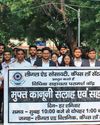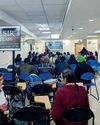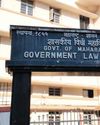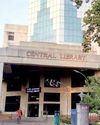
In the last five years, as undergraduate engineering seats gradually reduced, a vast majority of seats still went vacant in B.Tech programmes across the country, shows All India Council for Technical Education (AICTE) data.
The all-India capacity utilisation, AICTE data shows, has been only about half of the seats available in 2021-22, with 55 percent enrolment.
While the approved overall intake in 2021-22 was 25.39 lakh, just over 14 lakh students were enrolled, indicating that the supply of engineering seats is far in excess of demand. According to AICTE norms, “approved intake” means the maximum number of students that can be admitted in a course, excluding the supernumerary seats.
The latest All India Survey of Higher Education (AISHE) report also indicates a 10 percent drop in enrolment in undergraduate engineering degree courses. As per the AISHE, in courses like B.Tech and Bachelor of Engineering (BE), enrolment decreased by 10.3 percent – from 40,85,321 to 36,63,685 – between 2016 and 2021.
In the 2020-21 academic year, enrolment was 53 percent of the total capacity of 24 lakh seats. Meanwhile, states with highest seat shares in India recorded an average of 64 percent graduation rate in the batch of 2018-19. The AICTE data shows that the placements in the same states recorded an average of 60 percent at the end of B.Tech programme in the same year.
The table below shows the numbers for each year. The approved seats have increased in the last three years; however, the vacancy has also increased with it. Between 2019 and 2021, the vacancy has increased by 12 percent, from 9,84,264 in 2019-20 to 11,28,501 in 2021-22.
This story is from the {{IssueName}} edition of {{MagazineName}}.
Start your 7-day Magzter GOLD free trial to access thousands of curated premium stories, and 9,000+ magazines and newspapers.
Already a subscriber ? Sign In
This story is from the {{IssueName}} edition of {{MagazineName}}.
Start your 7-day Magzter GOLD free trial to access thousands of curated premium stories, and 9,000+ magazines and newspapers.
Already a subscriber? Sign In

Sleeper Cells: Law schools' 'dormant' legal aid clinics
A law college survey by the Supreme Court's policy centre found that a worrying number of legal aid clinics do little more than hold legal awareness camps, despite NALSA, BCI rules. This leaves gaps in legal education

Law's new niche frontiers
How niche law programmes are blending science with legal expertise, transforming legal education and creating specialised career paths

'GP Sir's classes' a ray of hope for the poor
Shrishti (name changed), 31, hails from the Valmiki community based in Gurdaspur, Punjab; she was born into a family of safai karamcharis - cleaners and at 21, married into another.

DU Law Faculty is part of CLAT 2025 but plans own exam: Dean
Delhi University's Faculty of Law will admit to its BBA LLB and BA LLB courses through the CLAT exam this year.

Studying law through films, novels, comics
Law schools are using various art forms - films, comics, theatre, puppetry

Legal education meets AI
As artificial intelligence reshapes industries, India’s leading law schools are introducing specialised courses and research initiatives, often in collaboration with technical institutions. But the need for comprehensive regulations persists

A LEGACY IN CRISIS
Asia's oldest law college and alma mater to legal luminaries, Government Law College, Mumbai, now grapples with declining standards, administrative apathy, and students' shifting educational aspirations

Law Colleges for 2025
Careers360 has ranked 100 law colleges and rated over 185 institutions, categorising them into distinct zones and states, for a comprehensive overview of legal education

IIT Madras introduces another quota
After admitting five students via the sports quota in 2024-25 - a first among the IITs Indian Institute of Technology Madras has now introduced another quota for \"fine arts and culture excellence\".

CLAT answer keys and court cases
Many Common Law Admission Test (CLAT) candidates claimed to find mistakes in its provisional and final answer keys.